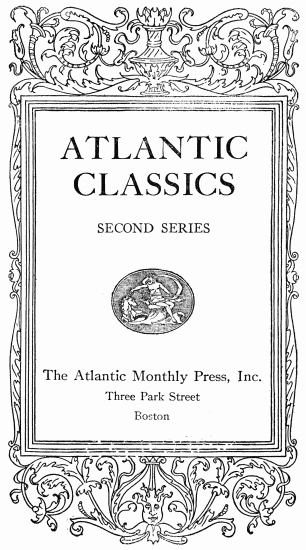
ATLANTIC CLASSICS
Second Series
COPYRIGHT, 1910, 1912, 1913, 1914, 1915, 1916, 1917 BY THE ATLANTICMONTHLY COMPANY
COPYRIGHT, 1899, 1903, 1907, BY HOUGHTON, MIFFLIN & COMPANY
COPYRIGHT, 1910, BY HOUGHTON MIFFLIN COMPANY
COPYRIGHT, 1914, BY JOHN JAY CHAPMAN
COPYRIGHT, 1916, BY THE MACMILLAN COMPANY
COPYRIGHT, 1918, BY THE ATLANTIC MONTHLY PRESS, INC.
TO
ATLANTIC READERS EVERYWHERE
FROM ALASKA TO ZANZIBAR
AND FROM NINE TO NINETY
Preface
WHEN, some two years ago a collection of Atlantic essays was offered tothe public, it was the editor's idea that this volume should be, to usethe current phrase, a kind of permanent exhibit of the character andquality of The Atlantic. In these hurrying days, even the sedatest ofmagazines must quicken its pace to keep abreast of the marching world,and much that is most serviceable in The Atlantic during its appointedlife dies at the heart when a new number brings fresh interests to men'sminds. But a residue there is, no more useful at the time, perhaps, thanmuch which perishes, but which evidently ought to have such length ofdays as the covers of a book can ensure for it. The experiment was madewith the first volume of Atlantic Classics, composed of sixteen essays,by as many authors, all dealing with topics of more than temporaryinterest. The success of this book, which has been many times reprinted,outstripped anticipation; more than that, it assumed a character quiteunlooked for, and proceeded, on its own account, to introduce itselfinto the curricula of colleges and high schools throughout the country,welcomed, as the editor is credibly informed, by students as well as byteachers.
Even a layman can see that in such a use there is a sound development. Abook of contemporary expression, exhilarating to the student andknitting his interests to those of the world outside the schoolroom, maybe peculiarly suited to call forth his appreciation and to kindleemulation within him. Such a book may teach him to think of literatureas a living thing, quite as alive and full of spirit as he is himself,and by such method, perhaps, tender shoots of young intelligence may bespared the blighting influence of too formal education.
These matters belong most properly to the province of the schoolmaster.The editor's is a different purpose. It is not a text which he seeks tocompile, but (forgive a layman's distinction) a book, a book to read,enjoy, and keep. To all who have found amusement and profit in the firstseries of Atlantic Classics, I think I can promise that here shall befound no lowering of the bars, but only the enlargement of interestwhich must come from such an influx of new company.
During pleasant hours spent in selecting this second series of essaystypical of The Atlantic, I have more than once turned aside to re-readwell-remembered
